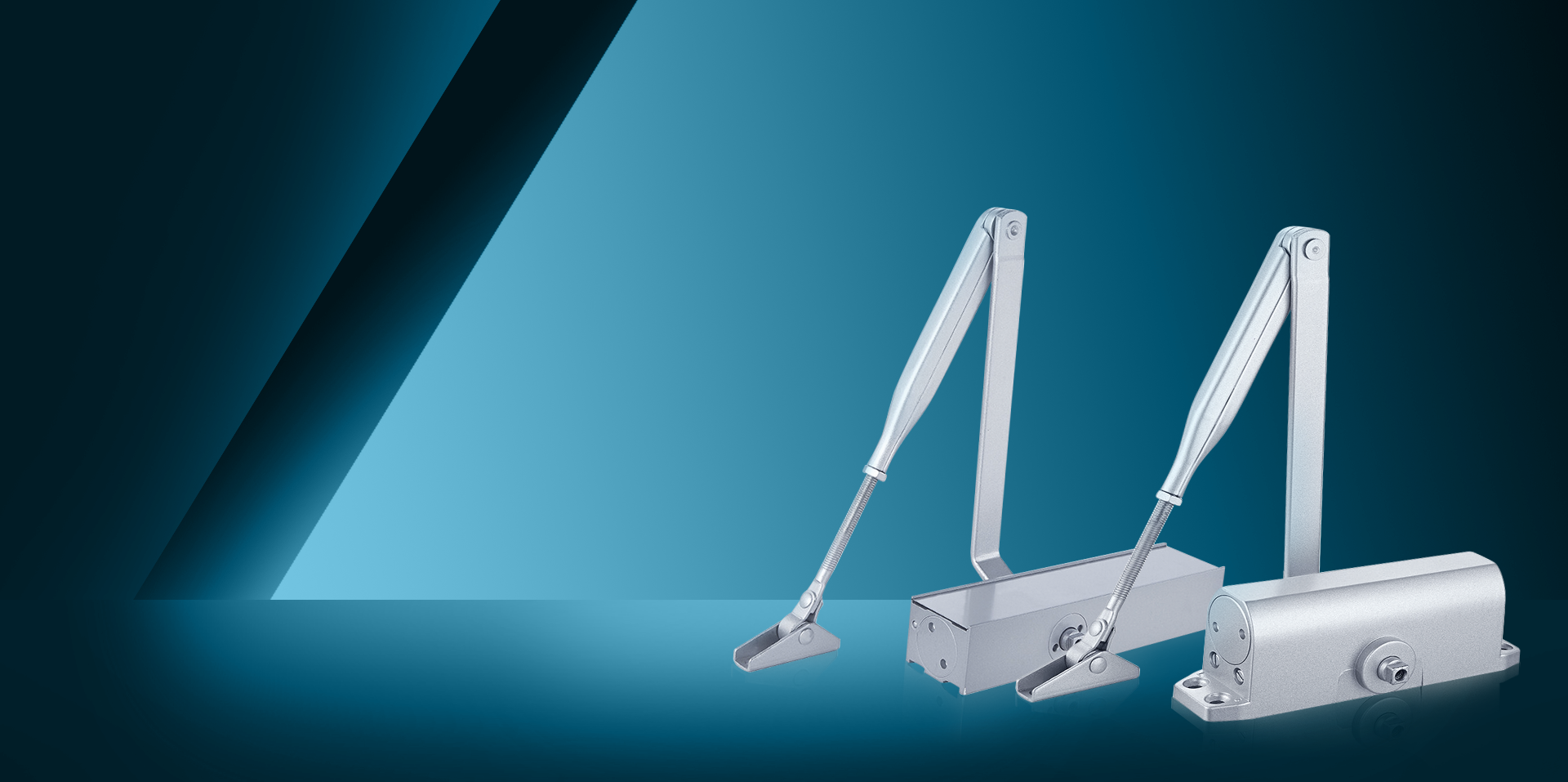Error de formato de correo electrónico
emailCannotEmpty
emailDoesExist
pwdLetterLimtTip
inconsistentPwd
pwdLetterLimtTip
inconsistentPwd

NOTICIAS

Choosing Between Pneumatic and Hydraulic Door Closers
I. Introduction
A. Overview of Door Closers
Door closers play a pivotal role in controlling the movement of doors, ensuring controlled closing and maintaining security. These devices are essential components in various settings, from residential homes to commercial buildings.
B. Importance of Choosing the Right Door Closer
Selecting the appropriate door closer is critical for optimizing functionality, security, and overall user experience. The choice between pneumatic and hydraulic door closers involves careful consideration of factors such as door size, usage patterns, and desired energy efficiency.
II. Pneumatic Door Closers
A. Introduction to Pneumatic Door Closers
Pneumatic door closers utilize air pressure differentials to control the closing of doors. This mechanism offers a range of benefits and considerations for various applications.
B. Advantages of Pneumatic Door Closers
Pneumatic door closers are lauded for their energy efficiency, providing a quieter and environmentally friendly option. They are particularly suitable for lighter doors and spaces where minimizing energy consumption is a priority.
C. Disadvantages of Pneumatic Door Closers
Despite their advantages, pneumatic door closers may struggle with heavier doors and might lack the precision of hydraulic counterparts. Understanding these limitations is crucial when assessing the suitability of pneumatic door closers for specific scenarios.
D. Ideal Use Cases for Pneumatic Door Closers
Pneumatic door closers excel in residential settings, small offices, or areas where energy efficiency is a primary concern. Their lightweight design and silent operation make them well-suited for spaces with moderate door traffic.
III. Hydraulic Door Closers
A. Introduction to Hydraulic Door Closers
Hydraulic door closers leverage fluid dynamics to ensure a controlled and smooth closing motion. These closers are known for their reliability and ability to handle heavier doors.
B. Advantages of Hydraulic Door Closers
The precise control offered by hydraulic door closers makes them a preferred choice for high-traffic areas and heavier doors. Their durability and ability to withstand varying weather conditions contribute to their popularity in commercial and public spaces.
C. Disadvantages of Hydraulic Door Closers
While hydraulic door closers excel in many aspects, they may require professional installation and periodic maintenance. Understanding these considerations is vital for maximizing the lifespan and efficiency of hydraulic door closers.
D. Ideal Use Cases for Hydraulic Door Closers
Hydraulic door closers are well-suited for commercial spaces, public buildings, and areas with heavy foot traffic. Their robust design and precise control make them ideal for doors that require frequent use.
IV. Comparison: Pneumatic vs Hydraulic Door Closers
A. Performance and Durability
Comparing the performance and durability of pneumatic and hydraulic door closers is essential for making an informed decision. Factors such as door weight, frequency of use, and environmental conditions should be considered.
B. Installation and Maintenance
The installation and maintenance requirements of pneumatic and hydraulic door closers vary. Professional installation may be necessary for hydraulic closers, while pneumatic closers may offer a simpler DIY installation process.
C. Considerations for Choosing Between Pneumatic and Hydraulic Door Closers
When deciding between pneumatic and hydraulic door closers, factors like door size, location, and budget considerations come into play. A thorough assessment of these factors ensures the selected door closer meets the specific needs of the application.
V. Common Issues with Hydraulic Door Closers
A. Overview of Common Hydraulic Door Closer Problems
Understanding common issues with hydraulic door closers is crucial for effective troubleshooting and maintenance. Issues such as misalignment, speed adjustments, and leaks can impact performance.
B. Focus on Hydraulic Door Closer Leaking Oil
One prevalent concern is the hydraulic door closer leaking oil, which can compromise functionality and pose environmental risks. Identifying the causes of oil leaks and addressing them promptly is essential for maintaining the integrity of the door closer system.

VI. Leaking Oil: Causes and Consequences
A. Causes of Hydraulic Door Closer Oil Leaks
Hydraulic door closer oil leaks can stem from issues such as worn seals, overfilled fluid reservoirs, or physical damage. Identifying the root causes is the first step in addressing and preventing oil leaks.
B. Potential Consequences of Oil Leaks
Beyond affecting door closer performance, oil leaks can lead to safety hazards and environmental concerns. Understanding the potential consequences underscores the importance of prompt detection and resolution.
VII. Troubleshooting and Repair
A. Step-by-Step Guide to Troubleshooting Oil Leaks
Effectively troubleshooting hydraulic door closer oil leaks involves systematic steps, from inspecting seals to adjusting fluid levels. This step-by-step guide empowers users to identify and resolve issues independently.
B. Tips for Repairing or Replacing Leaking Hydraulic Door Closers
For more complex issues or cases of irreparable damage, users may need to consider professional repair or replacement options. Tips for choosing replacement parts or hiring qualified professionals ensure a reliable solution.
VIII. Preventive Maintenance
A. Strategies for Preventing Hydraulic Door Closer Issues, Including Oil Leaks
Implementing preventive maintenance strategies is key to extending the lifespan of hydraulic door closers. Regular inspections, lubrication, and adherence to manufacturer guidelines contribute to a proactive maintenance approach.
B. Importance of Regular Maintenance
Regular maintenance not only prevents issues but also ensures optimal performance and safety. Communicating the importance of routine checks to end-users encourages a proactive approach to door closer upkeep.
IX. When to Seek Professional Help
A. Indications That Professional Assistance Is Required
Recognizing when professional assistance is necessary is crucial for addressing complex issues and ensuring the longevity of the door closer system. Indications such as persistent malfunctions or structural damage warrant expert intervention.
B. Choosing a Qualified Door Closer Maintenance Professional
Selecting a qualified door closer maintenance professional involves considering factors such as experience, certifications, and customer reviews. This ensures that repairs or replacements are conducted with precision and reliability.
X. Conclusion
A. Summary of Key Points
Reflecting on the key points discussed throughout the article emphasizes the importance of a well-informed decision when choosing between pneumatic and hydraulic door closers.
B. Making an Informed Decision for Door Closer Selection
In conclusion, the choice between pneumatic and hydraulic door closers involves weighing advantages, disadvantages, and specific use cases. Armed with knowledge about common issues, troubleshooting techniques, and preventive maintenance, users can confidently make decisions that align with their needs and priorities. A careful consideration of these factors ensures the longevity and optimal performance of door closers in diverse settings.
